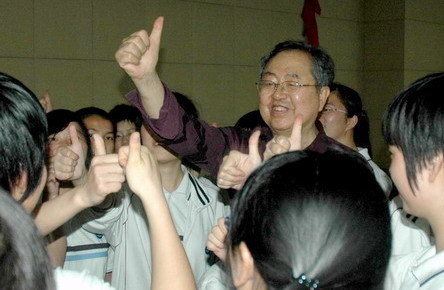Society
Positive thinkers will score higher
By Chen Xin (China Daily)
Updated: 2010-06-08 07:45
 |
Large Medium Small |
|
|
BEIJING - At 7:40 am on Monday, Wang Jisheng stood outside the high school affiliated with Renmin University of China, one of the spots where the gaokao, the country's annual college entrance exam, was held.
With notebook in hand, the psychologist inquired about the mental state of each student taking the gaokao and tried to encourage them.
| ||||
He attributed this to the students having a greater opportunity of success, since a larger proportion of them - 85 percent - are to be admitted to higher education this year in Beijing, 5 percent higher than last year.
"Their parents also did not look as uneasy as they have in past years," Wang said.
Every year, the 73-year-old comes to the school on June 7-8, when the gaokao takes place in Beijing. The conversations that take place between him, the students and their parents provide fresh material for his ongoing study of providing psychological guidance for high school graduates.
Wang, who is the first scholar in this field in China, began the project 15 years ago and has published 28 books on the subject.
He was a psychologist and researcher at the Institute of Psychology, Chinese Academy of Sciences. Although he retired in 2004, high schools continue to invite him to speak with graduates prior to the gaokao to help boost their confidence.
"My doctrine is that the better shape a student is in, the higher marks he or she will receive on the exam," Wang said.
He explained that being in good shape consists of a sound academic education, a healthy body and a positive frame of mind. According to Wang's study, high school graduates are under enormous pressure to do well on the exam at a time in their lives when they may be lacking confidence and be easily distracted.
"Half of the marks on the gaokao are determined by students' mental state," Wang said, adding that positive thinking helps.
According to his study, more than 60 percent of students do not know how to adjust their thought processes. He also suggests that students apply to universities that are a good fit for their skills and abilities, rather than to compare themselves to their fellow classmates.
He has created a set of mental gymnastics to help students cheer up.
Demonstrating how to do them, he stood up, bent his arms, pulled them back, forward and then up over his head while uttering the affirmation "Be vigorous, be happy!"
He said that repeating the movements and affirmations nine times while smiling will help students attain a positive mental state.
Wang said many students' parents call him before the gaokao every year, asking him to help ease the pressure their children are under and to build up their confidence.
Casting his mind back, Wang related a story that took place six years ago: "A student's mother in Beijing called me at round 3 am on June 7. She told me that her son wanted to quit the exam because he was worried he would not succeed.
"I asked her to pass the phone to her son. I asked him why he wanted to give up on the exam. He said he was not well prepared and that there were still many exercise books undone on his desk.
"I wanted to cheer him up, so I asked him if he had done all the assigned homework. He said yes. So I told him 'You will definitely enter the university you want, because doing all the assigned exercises is enough.'
"I also told him that he was ready for the exam, that he should be confident and believe in himself," Wang said, adding that the student succeeded.
Over the past 15 years, Wang has conducted detailed interviews with more than 400 students across China who achieved top marks on the gaokao. He also spoke with some of their parents and visited more than 300 high schools and surveyed over 40,000 students.
"According to my study, students who achieve high marks on the gaokao are from good families, which listen to their children's voices and respect their choices. They also never randomly beat or scold their children."
To help ease the pressure, he advised parents not to accompany their children to the exam.




